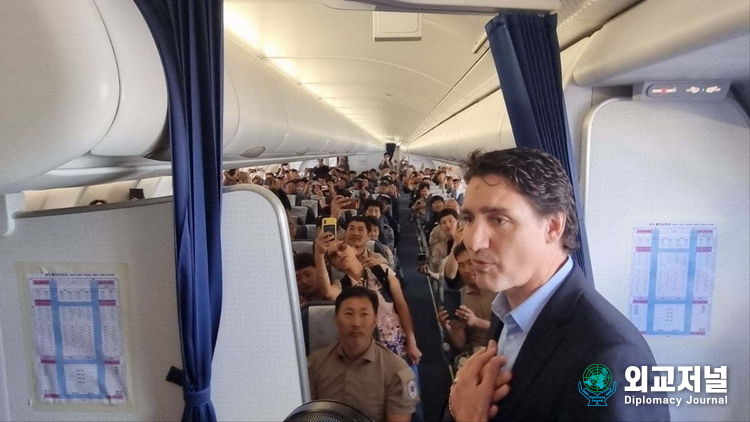By Anna Kim
The Korea Disaster Relief Team (KDRT), dispatched to Canada on July 2 to support the suppression of wildfires therein, left Canada on August 1, local time, and arrived in Korea on August 2 after a month of firefighting operations in the country.
Prime Minister of Canada Justin Trudeau made a surprise visit to the KDRT aboard a Korean transport aircraft and extended appreciation to Korea, saying that all Canadians were moved by Korea’s dispatch of the KDRT at a time when Canada was facing difficulties due to its worst-ever wildfires. Taking a tour of the aircraft cabin, the Prime Minister exchanged farewells with the members of the KDRT.

Before heading to an airport on August 1, the KDRT visited the National War Memorial in Ottawa, laid a wreath and had a moment of silence, taking the opportunity to pay tribute to Canada for its noble sacrifice and dedication demonstrated through the dispatch of troops to fight alongside Korea during the Korean War.
Director General for North-East Asia at Global Affairs Canada Joya Donnelly, who joined the KDRT at the event, expressed gratitude to Korea, saying that Canada helped Korea at its difficult time by dispatching troops, and this time around, Korea helped Canada at its difficult time by dispatching the KDRT.
The KDRT, together with the team from the United States, carried out firefighting operations for 12 hours a day at wildfire sites in Lebel-sur-Quevillon in Quebec from July 4 to 30.
Korea being the first Asian country to send a relief team to Canada, the government, local media outlets and residents of the country highly appreciated the KDRT’s operations and conveyed appreciation. As can be seen from this, the dispatch of the KDRT served as an opportunity to promote friendly awareness of Korea even in parts of Canada that had rarely engaged in exchanges with Korea.
Korea and Canada, which mark the 60th anniversary of the establishment of diplomatic relations this year, are long-standing friends and “comprehensive strategic partners” that share core values, such as liberal democracy and market economy.
Building upon Canada’s crucial support during the Korean War, the Korea-Canada bilateral relationship has reached new heights, evident through the KDRT deployment, cementing their enduring collaboration. In addition, the two countries broadened the base for cooperation not only in putting out wildfires but also in a range of climate change-related issues.
Through the KDRT’s firefighting operations with the U.S. team in Canada, Korea, the U.S. and Canada built a model practice of trilateral disaster response in the year marking the 70th anniversary of Korea-U.S. alliance and the 60th anniversary of Korea-Canada diplomatic ties. Bea Day, head of the U.S. team, presented a certificate of appreciation to the KDRT, thanking it for its dedication and assistance.
The dispatch of the KDRT, the second of its kind this year following the one to Türkiye in February over its earthquake, marks the tenth case of dispatch since the enactment of the Overseas Emergency Relief Act in 2007 and the first overseas dispatch for wildfire suppression.
The Korean government will contribute actively to disaster relief efforts overseas in a way that is commensurate to its pursuit to become a global pivotal state and to its standing as one of the world’s eight powers. Furthermore, amid the growing demand for international cooperation over the Ukrainian war and the increasing damage from wildfires, desertification, extreme heat waves and heavy rains caused by climate change, the Korean government will continue to double its efforts to meet these demands and contribute to fulfilling humanitarian values.







